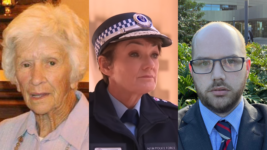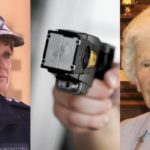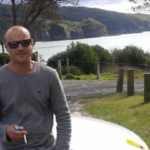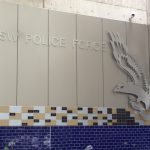NSW Police: Killing Individuals Undergoing Mental Health Crises Since Inception

The since-deceased Andrew Pinnock told his long-time GP that he’d be dead by afternoon’s end on Wednesday 10 January, as, the man who was once charged with impersonating a lawyer, produced a Glock pistol at Nowra’s Junction Street Medical Centre and commenced a two-hour long siege.
Pinnock, who was known to have long suffered from mental health issues, was correct in his estimation, as NSW police officers killed him, firing 15 bullets upon the 34-year-old just after 3 pm that afternoon, which brought the mental health episode civilian death toll to five since last May.
NSW Greens MLC Sue Higginson, who’s been pushing for action on this since the death of a 95-year-old great-grandmother as a result of a police tasering in May, outlined a fortnight ago that over the 12 months to June last year, 15 civilians having mental health episodes had been killed by police.
Higginson has consistently called on the Minns government to hold an inquiry into the issue. This was followed by the National Justice Project demanding a Royal Commission on the countrywide problem, while NSW decided to hold a mental health access inquiry that would deliberate upon it.
The Pinnock killing taking place in the second week of 2024 meant it didn’t receive the attention it would at any other time, especially as NSW parliament is yet to reconvene, while the Murdoch press headline – “Fake lawyer killed in a hail of bullets”- tended to hide its mental health aspect.
But the NSW Police Force and the state government cannot simply wait for the attention given to this issue to subside, as both institutions have simply accepted that this deadly tactic taken to mental health crises is the only approach available since they were both established in the 1800s.
Alternatives operating
NSW Greens MLC Dr Amanda Cohn is chairing the last July-established NSW mental health access inquiry, which is charged with looking at the use of state law enforcement officers as the first line of call in regard to mental health episodes: an issue that garners media attention after every spate.
“It’s clear that police are not the best agency to lead responses to people experiencing acute mental distress, psychosis, delirium, dementia or intoxication,” Cohn told Sydney Criminal Lawyers last September, noting that the inquiry will be exploring alternatives.
“Police officers are not mental health professionals,” the former Albury GP made clear. “I’ve heard over and over again stories where the presence of police escalated the distress of a vulnerable person rather than deescalating the situation.”
Cohn further pointed to London Metropolitan Police having last year launched a new initiative that sees health professionals sent out as first responders to such incidents, while the ACT’s PACER program sends out a paramedic, a mental health clinician and a police officer to respond.
“These programs have all been really well received by the community and have the added benefit that far fewer people are transported to hospital emergency departments,” Dr Cohn underscored.
Excessive force a national issue
A key incident highlighting the need for NSW parliament to pass laws that would facilitate a different approach to dealing with mental health episodes in the community is the police killing of Todd McKenzie in his home in the NSW regional town of Taree on a July evening in 2019.
The National Justice Project has been representing McKenzie’s family during the inquest, which found that police were aware of his mental health issues but officers taunted him about them during a standoff, while specialist officers stormed his house and shot him, with their cameras turned off.
NJP director George Newhouse told SCL last August that his legal service supported Higginson’s calls for a NSW parliamentary inquiry into NSW police use of force, following an officer having recently been caught applying a leg sweep to a First Nations teen with disabilities.
Newhouse and NJP founder Duncan Fine, however, upped the ante the following month, when the pair penned an opinion piece calling for a Royal Commission to be held on the use of weapons and the approach taken to mental health crises by Australian police in general.
And the coauthors noted that “it’s not just the culture of our police that is in question”, as “all state governments, cheered on by the usual suspects of raucous conservative elements in the media, are responsible for this situation, with their predictable and cynical ‘tough on crime’ campaigns”.
A problem with police
The incident that has again drawn attention to this issue, and served to grab international headlines due to its extreme nature last May, saw a police officer fatally taser 95-year-old Clare Nowland, who suffered dementia, and was approaching him holding a steak knife, whilst using a walking frame.
NSW police senior constable Kristian White, who thought it was reasonable to taser the woman who was clearly suffering an episode, was initially charged with three assault offences, each with differing degrees of seriousness, and in November, an additional charge of manslaughter was added.
Yet, while punishing individual officers for use of force during such incidents might be a break from the past, successive examples reveal that this is an issue that requires alternative approaches, as sanctioning multiple culprits trained to act in this manner will not solve the problem.
“This is a systemic issue, as has been shown by the revelations of other incidents of police using excessive and lethal force on vulnerable people following the tasering of Clare Nowland,” Higginson told SCL in mid-2023.
“Under no circumstances should the NSW community have to accept police use of excessive force or police violence,” the NSW Greens justice spokesperson underscored.
“There are an alarming number of reports of police causing harm. We need to accept that we actually have a police problem in NSW.”







